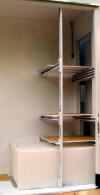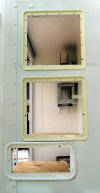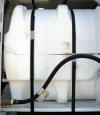
Plenty of Hot Water
We weren't sure how much hot water was too much, but 20 gallons may be close to it. The system has two ten gallon water heaters. They are both from Atwood Mobile. Each unit has three sources of heat.
The first method is the vehicle's engine. It generates excess heat so we use that as a pre-heating. The radiator/cooling system is tapped and the fluid that runs through the engine, radiator and cab heater is also routed to the rear of the body and connected to heat exchangers in the water heaters. There are no controls on this flow.
The primary method of heating water is LP gas. The heaters also have a 1500 watt electric heating element. These can be used for quick heating or heating when the LP tank runs empty.
Each heater has a small control panel with two switches; one to enable gas heat, the other to enable the electric element. Both of these heating methods are controlled by the unit's thermostat. The electric elements are connected to circuits run directly from the generator.
Installation
Structural
The heaters mount through the vehicle body, taking combustion air and exhausting to the outside. The photos below show the internal supports, made from steel strut, and the body cutouts. Empty, the heaters are quite light. Filled they will weigh about 100 pounds.
The units mount securely in the recessed, framed, opening. The body of the heater, where the mass of the water is, did not have any obvious points for attachment. The tank is enclosed in a Styrofoam insulating jacket. The entire unit is secured to the supporting shelf with packing bands.
The most likely area to feel force seemed to be the forward motion of the units when braking. The space between the heater body and wall of the equipment compartment is filled with polyurethane foam, enclosed in plastic bags, to provide a custom formed buffer.
One thing not mentioned in the manual is which water connection is the inlet and which is the outlet. Water goes in the lower opening, and out the upper. The connections for the engine heater lines don't manner.
Electrical Connections
The heater has two electrical connections, 110 VAC and the dual switch control connections.




